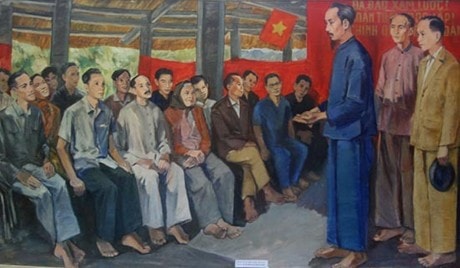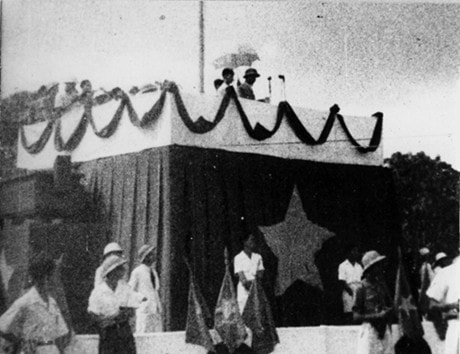This Day 69 Years Ago - Vietnam Independence
The historical reality of the past 70 years has affirmed that the August Revolution of 1945 and the birth of the Democratic Republic of Vietnam were the result of Uncle Ho's 30-year journey to find a way to save the country and were the inevitable result of his great contributions in preparing for the liberation revolution since the day he returned to the country.
 |
| The National Congress on August 16, 1945 at Tan Trao communal house elected the Vietnam National Liberation Committee with Uncle Ho as chairman - Document of Nguyen Hoc |
After being proposed and approved by the Communist International, in the winter of 1938, Uncle Ho went to China under the name Ho Quang, with the rank of Major, looking for a way to return home to directly lead the national liberation revolution. In February 1940, under the alias "Mr. Tran", Uncle Ho went to the house of Mr. and Mrs. Tong Minh Phuong, an overseas Vietnamese at 76 Kim Binh Street in the inner city of Kunming, and he established a connection with the Party and the revolutionary movement in the country through the Party's Overseas Work Committee.
History will forever remember: On January 28, 1941, the country welcomed a son of the nation, who had been searching for the truth for 30 years to help his people. With the help of local officials and people, on February 8, 1941, with the new name Gia Thu, Uncle Ho lived and worked in Coc Bo cave (Nung language means source), a secluded mountain cave in the majestic mountain range.
At Coc Bo cave, Uncle Ho carved a statue of Karl Marx on a stalactite, so he named it Karl Marx Mountain, in Pac Bo village, Truong Ha commune, Ha Quang district, Cao Bang province. He had nothing but a rattan suitcase containing documents, a typewriter and a wooden floor. During the day, Uncle Ho went to the stream at the source (which he named Lenin stream), his assistants created a table and a chair for him from stones put together for him to work. And "in the morning he went to the stream, in the evening he went to the cave", he began to take care of a great cause "building a country with both hands".
In May 1941, Uncle Ho convened and chaired the 8th Party Conference in Khuoi Nam (Pac Bo) to decide to gain independence and freedom for the entire nation. The conference decided to establish the Vietnam Independence League, abbreviated as Viet Minh. The Viet Minh Front attracted and gathered the masses of the whole country to rise up and seize power, contributing decisively to the success of the August Revolution. The role of President Ho Chi Minh was extremely great, the one who steered the revolutionary ship through the storm to reach the shore of independence and freedom.
In 1941-1942 in Cao Bang, Uncle Ho wrote many works calling for the whole people to unite, propagandize and encourage all classes and strata to wait for the opportunity to rise up and fight the enemy to save the Fatherland, such as: Advising compatriots to buy the newspaper Vietnam Independence (August 1, 1941); Ten policies of Viet Minh (1941); Farmers (August 22, 1941); Women (September 1, 1941)...
In his work History of Our Country (February 1942), Uncle Ho made a prediction about the time of our country's independence: "Vietnam's independence: 1945". And history has proven his genius when on September 2, 1945, our new Vietnam was born.
Emerging from the above works are the crucial issues for a liberation revolution: First is the expansion of people's knowledge as in the article advising compatriots to buy Viet Lap newspaper, Uncle wrote "Make us open our eyes and ears/Let us know this and that... Let us know what our country is...". Second is the issue of organization, Uncle considered this to be one of the decisive factors helping the revolution to succeed soon and the role of the organization is the leadership, the direction of the Viet Minh Front "Capable enough to lead us in the struggle". Third is the issue of solidarity, from Uncle Ho's works all said: We must know how to unite. We must unite to fight.
Regarding the preparation of forces for the liberation revolution, Uncle Ho wrote his first work on the military, Guerrilla Fighting (1941). The work contributed significantly to educating patriotism and the spirit of solidarity in fighting for party members and revolutionary masses, while introducing historical experiences and initially raising a number of issues on military guidelines in preparation for an armed uprising.
Along with preparing training materials, Uncle Ho opened the first military class in Pac Bo, and he called it the Pac Bo guerrilla class, and he assigned comrade Dinh Suu (aka comrade Truong Thiet Hung - later a general in the army) to be in charge of the class. The students of the class recounted the story of Uncle Ho teaching a lesson about national respect: That day, when it came to the gun salute class, the whole class was at a loss as to how to salute, when Uncle Ho came to visit and asked:
- Is there anything difficult?
After comrade Dinh Suu reported, Uncle asked:
- How do Westerners greet?
Comrade Dinh Suu set an example, Uncle asked again:
- What kind of ship salute?
Comrade Dinh Suu held the gun as a demonstration, Uncle said:
- How about a non-Western, non-Chinese style?
And Uncle Ho showed the whole class how to do it: Raise the gun, tilt the muzzle slightly forward, put the butt of the gun close to the thigh, the gun and the person forming a V. Looking at the students in the class doing it one by one, Uncle Ho said:
- Okay, salute in Viet Minh style (1).
After a period of preparation, on December 22, 1944, the Vietnam Propaganda Liberation Army was established under Uncle Ho's instructions. This was the predecessor of the powerful Vietnam People's Army, bearing the nature of "Uncle Ho's soldiers": "Loyal to the country, filial to the people. Complete any mission. Overcome any difficulty. Defeat any enemy" contributing to the nation's victory.
Uncle Ho taught: "To make a revolution, we must know how to rely on opportunities and must look at the general movement everywhere and everywhere to win" (2), so when the Second World War turned in favor of the Allies, Uncle Ho determined the mission for our country's revolution: "The invading side is close to being destroyed. The Allied nations are about to achieve final victory. The opportunity for our nation to liberate is only in a year, or a year and a half. Time is very urgent, we must act quickly";
On the night of March 9, 1945, Japan staged a coup to oust the French colonialists and monopolize Indochina. Faced with the new situation, in order to promptly direct the revolutionary movement that was rising throughout the country, from the beginning of May 1945, Uncle Ho ordered the "headquarters" of the revolution to be moved from Pac Bo (Cao Bang) to Tan Trao (Tuyen Quang) to prepare for the general uprising.
 |
| President Ho Chi Minh reads the Declaration of Independence at Ba Dinh Square on September 2, 1945 - Photo archive |
Following Uncle Ho's instructions, on June 4, 1945, the Viet Minh General Department convened a Conference of Cadres to officially declare the establishment of the Liberated Zone - the image of a new Vietnam for the general uprising. In August 1945, Nazi Germany surrendered to the Allies, Uncle Ho and the Party Central Committee held the National Conference of the Party and the National Congress of Delegates in Tan Trao. Uncle Ho issued the directive: "Now the favorable opportunity has come, no matter how much sacrifice, even if we have to burn the entire Truong Son range, we must resolutely gain independence."
To lead the national liberation revolution to victory, the Tan Trao National Congress elected the Vietnam National Liberation Committee with Uncle Ho as its chairman. The Tan Trao National Congress fulfilled its duties as an elected National Assembly. The Congress demonstrated the unity of the entire Vietnamese people in the Viet Minh Front, expressed absolute trust in the leadership of the Party and leader Ho Chi Minh, expressed the will and determination to bring the general uprising to complete victory on August 19, 1945 and September 2, 1945, Uncle Ho read the Declaration of Independence giving birth to the Democratic Republic of Vietnam.
Through the above evidence, it is clear that Pac Bo - Cao Bang, in which Coc Bo and Khuoi Nam are the starting point of the Party's and Uncle Ho's elaborate and thoughtful preparations, firmly ensuring the success of the August Revolution in 1945, as Uncle Ho affirmed during his return visit here (February 1961): "Twenty years ago in this cave/ The Party outlined the path to fight the Japanese and the French/ Led the entire people to fight/ The beautiful country exists today".
(Dr. Tran Viet Hoan)
| Talking about Uncle Ho's careful preparation for the August Revolution in 1945, in early 1947, Mr. Huynh Thuc Khang (1846-1947) (in the name of the President of the Vietnam National Association) wrote a long letter in Chinese (in the form of a poem) entitled "Respectfully reporting to the compatriots and elders of the resistance war" stating: The most beloved person of our compatriots is Mr. Ho Chi Minh; a great patriot; a revolutionary expert with great experience: walking all over the five continents, eyes looking thousands of miles away. Clearly recognizing the times, silently waiting for the opportunity. Organizing the liberation guerrillas, leading the youth, cadres, and soldiers. The army and people have one will, a wish for thousands of hearts. Accumulating for a long time, honing and standing up. Leading the way, raising hands and calling is the Viet Minh front. Responding, waving sticks and standing up are the militiamen of the whole country... The heroic strength is the volunteer soldiers of the self-defense team. A glorious school, the country forever. The chains of tyranny for over eight centuries were swept away by buffalo hooves and horse feet. The farce of tyranny for three thousand years, the scene of tigers and pits remained silent. What a joy, escaping slavery to become the master. What a joy, exchanging the king's power for a new nation" (3). |
(1) The Source. Literature Publishing House 1970;
(2) Ho Chi Minh - Biography. Political Theory Publishing House 2006, p.264, p.308;
(3) Meetings with Uncle Ho. Da Nang Publishing House 1985, pp.25-26.
According to chinhphu.vn






